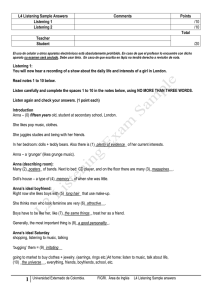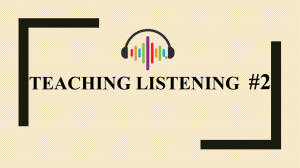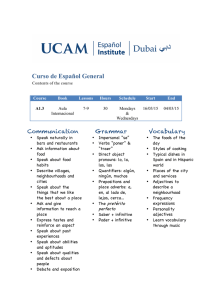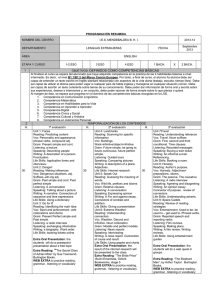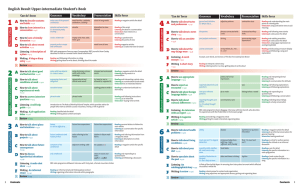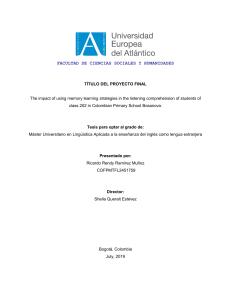Contenido del curso
Anuncio
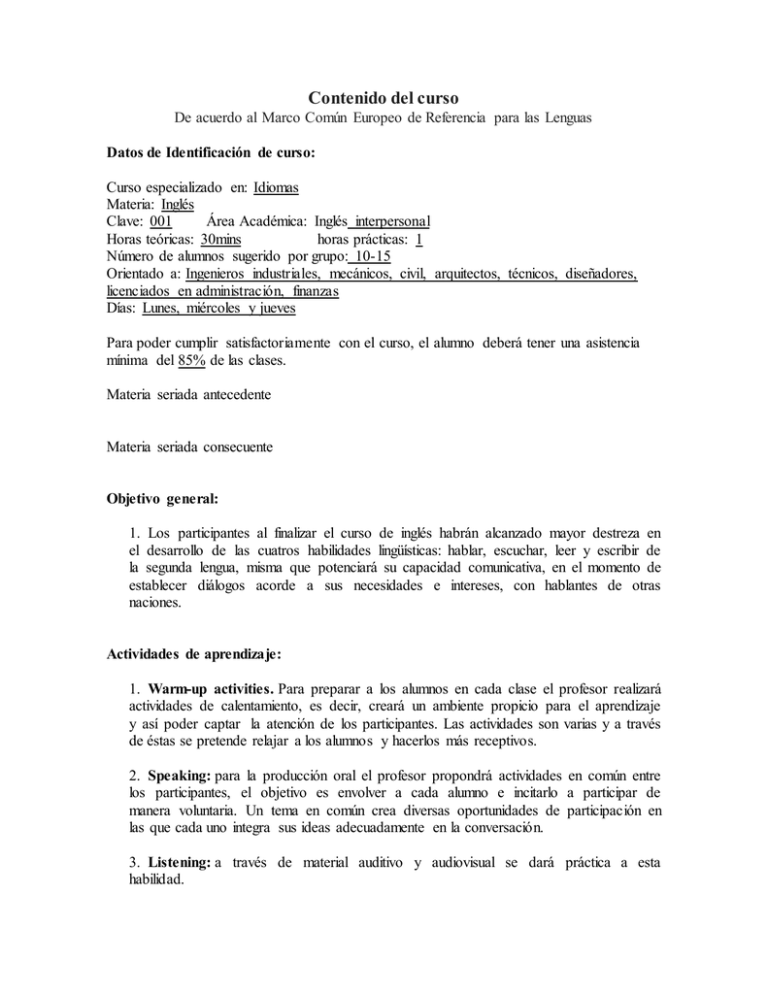
Contenido del curso De acuerdo al Marco Común Europeo de Referencia para las Lenguas Datos de Identificación de curso: Curso especializado en: Idiomas Materia: Inglés Clave: 001 Área Académica: Inglés interpersonal Horas teóricas: 30mins horas prácticas: 1 Número de alumnos sugerido por grupo: 10-15 Orientado a: Ingenieros industriales, mecánicos, civil, arquitectos, técnicos, diseñadores, licenciados en administración, finanzas Días: Lunes, miércoles y jueves Para poder cumplir satisfactoriamente con el curso, el alumno deberá tener una asistencia mínima del 85% de las clases. Materia seriada antecedente Materia seriada consecuente Objetivo general: 1. Los participantes al finalizar el curso de inglés habrán alcanzado mayor destreza en el desarrollo de las cuatros habilidades lingüísticas: hablar, escuchar, leer y escribir de la segunda lengua, misma que potenciará su capacidad comunicativa, en el momento de establecer diálogos acorde a sus necesidades e intereses, con hablantes de otras naciones. Actividades de aprendizaje: 1. Warm-up activities. Para preparar a los alumnos en cada clase el profesor realizará actividades de calentamiento, es decir, creará un ambiente propicio para el aprendizaje y así poder captar la atención de los participantes. Las actividades son varias y a través de éstas se pretende relajar a los alumnos y hacerlos más receptivos. 2. Speaking: para la producción oral el profesor propondrá actividades en común entre los participantes, el objetivo es envolver a cada alumno e incitarlo a participar de manera voluntaria. Un tema en común crea diversas oportunidades de participación en las que cada uno integra sus ideas adecuadamente en la conversación. 3. Listening: a través de material auditivo y audiovisual se dará práctica a esta habilidad. 4. Reading: para desarrollar la comprensión lectora se utilizarán diversos fragmentos de fuentes variadas como, revistas, poemas, cuentos, novelas, canciones, artículos, etc. Al mismo tiempo se practicará la lectura en voz alta, lo cual ayudará a desarrollar la pronunciación, adquirir nuevo vocabulario junto con su significado y producción oral. 5. Writing: la práctica de las escritura se hará a través de la narración de experiencias cotidianas, escritos dirigidos a amigos o familiares en circunstancias informales, de esta manera los alumnos practicarán la redacción partiendo de escritos sencillos a otros más complejos como el ensayo. Table of contents A1 Speaking Introducing yourself and friends, saying hello and good bye; spelling and asking for names and phone numbers. Naming objects, asking for and giving the location of objects. Talking about cities and countries, asking for and giving information about places of origin, nationality, language, age. Describing people. Asking about and describing clothing and colors. Talking about the weather and seasons. Finding the owners of objects. Asking for and telling time. Asking about and telling current activities. Grammar Possessive adjectives, the verb be, affirmative statements and contractions. Articles a, an, the. This / these. Plurals. Yes or no and where questions with be. Prepositions of place. The verb be: affirmative and negative statements. Yes or no questions, short answers and wh questions. Possessive adjectives. Pronouns, names and whose. Present continuous. Conjunctions. Placements of adjectives before nouns. Times expressions. Present continuous. Wh questions. Pronunciation/Listening Spelling of names and phone numbers. Plural s endings. Listening for the location of objects. Syllable stress. Listening for countries, cities and languages. Listening to the description of people. Letters s and sh. Listening description of clothing and colors. Raising and falling intonation. Listening for times of the day. Listening to identify people´s actions. Writing/Reading Writing list of names and phone numbers. Writing the location of objects. Writing questions requesting personal information. Writing questions about what people is wearing. Writing times of the day. Table of contents A2 Speaking Asking for and giving information about how people go to work or school. Talking about family members. Describing daily and weekly routines. Asking about and describing houses and apartments. Talking about the furniture in a room. Asking for and giving information about work. Giving opinions about jobs. Describing workday routines. Talking about food likes and dislikes. Giving opinions about healthy and unhealthy food. Describing eating habits. Talking about sports you watch and play. Asking for and giving information about abilities and talents. Asking about birthdays. Talking about plans for the evening, weekends or other occasion. Describing health problems. Talking about common medication. Giving advice for health problems. Talking about stores and other places. Asking for and giving directions. Asking for and giving information about weekend and vacations activities. Grammar Simple present statements with regular and irregular verbs. Simple present yes or no and wh- questions. Simple present time expressions. Simple present short answers. There is / there are. Simple present, wh questions with do and does. Placements of adjectives after be and before nouns. Some and any. Count and non-count nouns. Frequency adverbs. Simple present. WH questions. Can for ability. Yes or no and wh questions with can. Future with be going to. Yes or no and wh questionswith be going to. Future time expressions. Have + noun. Feel + adjective. Negative and positive adjectives. Imperatives. Prepositions of place. Giving directions with imperatives. Simple past statements with regular and irregular verbs. Simple past yes or no questions and short answers. Pronunciation/Listening Third person singular s ending. Listening for activities and days of the week. Words with th. Listen to descriptions of homes. Listening to people shop for furniture. Reduction of do and does. Listening to people describe their jobs. Sentences stress. Listening for people`s food preferences. Pronunciation of can and can`t. Listening for people favorite sports to watch or play. Listening to people talking about their abilities. Reductions of be going to. Listening to people talking about their evening plans. Listening people talk about health problems. Listening for medications. Listening people talk about shopping. Listening to directions. Simple past –ed endings. Listening to people talk about their past summer activities. Writing/Reading Writing about your family. Writing about your dream home. Writing about jobs. Writing questions about mealtime habits. Writing questions about sports. Talking about weekend plans. Writing advice for health problems. Writing directions. Writing about last weekend. Table of contents A2 plus Speaking Asking and giving information about date and place of birth. Describing school experiences and memories. Describing people`s locations. Making phone calls. Leaving phone messages. Making, accepting and declining invitations. Making excuses. Talking about prices. Giving opinions, discussing preferences, making comparisons. Buying and selling things. Talking about likes and dislikes. Giving opinions. Making invitations and excuses. Grammar Statements and questions with the past of be. Wh questions with did, was and were. Prepositional phrases. Subjects and object. pronouns. Invitations with do you want to…? And would you like to…? Verb+to. Demonstratives. One and ones. Questions: how much and which. Comparisons with adjectives. Yes or no and wh questions with do. Question: what kind…? Object pronoun. Modal verbs. Questions for describing people. Modifiers with participles and prepositions. Present perfect. Yes or no and wh questions, statements and short answers with regular and irregular past participle. Already and yet. For and since. Present perfect vs simple past. Past tense, used to for habitual actions. Adverbs of quantity with count and non-count nouns: too many, too much, fewer, less, more, not enough. Indirect questions from Wh-questions. Evaluation and comparisons with adjectives: not…enough / too / (not) as … as. Evaluations and comparison with nouns: not … enough, too much/ many… (not) as much / many…as;wish. Simple past vs present perfect. Sequence adverbs. Future with be going to and will. Modals for necessity and suggestion. Two part verbs. Will for responding to requests. Request with modals and: would you mind…? Infinitives and gerunds for uses and purposes. Imperative and infinitives for giving suggestions. Relative clauses of time. Adverbial clauses of time. Time contrast. Conditional sentences with if clauses. Gerunds. Short responses. Clauses with because. Table of contents B1 Speaking Talking about Landmarks and Monuments; Describing Countries; Discussing Facts. / Asking about someone`s Past. Describing Recent experiences. / Describing movies and books. Talking about actors and actresses. Asking for and giving reactions and opinions. / Interpreting body language. Explaining gestures and meanings. Describing emotions. Asking about signs and meanings. / Speculating about past and future events. Describing a predicament. Giving advice and suggestion. / Reporting what people say. Making requests. Making invitations and excuses. / Describing personalities. Expressing likes and dislikes. Agreeing and disagreeing. Complaining. Grammar Passive with by (simple past). Passive without by (simple present). / Past continuous vs simple past. Present perfect continuous. / Participles as adjectives. Relative clauses. / Modals and adverbs. / Unreal conditional sentences with if clauses. Past modals. / Reported speech. Requests. Reported speech statements. / Relative pronouns as subjects and objects. Clauses with it + adverbial clauses with when. Pronunciation/Listening The letter o. Listening to descriptions of monuments; listening for information about the country. / Contrastive stress in responses. / Listening to people talk about recent experiences. / Emphatic stress. / Listening for opinions. / Listening to a movie review. Pitch. / Listening to people talking about meaning of signs. / Reduction of have. / Listening to people speak about predicaments. / Reduction of had and would. Listening for excuses. / Listening to voice mail messages. Writing/Reading. Writing a guidebook introduction. / Writing a short story. / Writing a movie review. / Writing a list of rules. / Writing a letter to an advice columnist. / Writing a voice mail message
